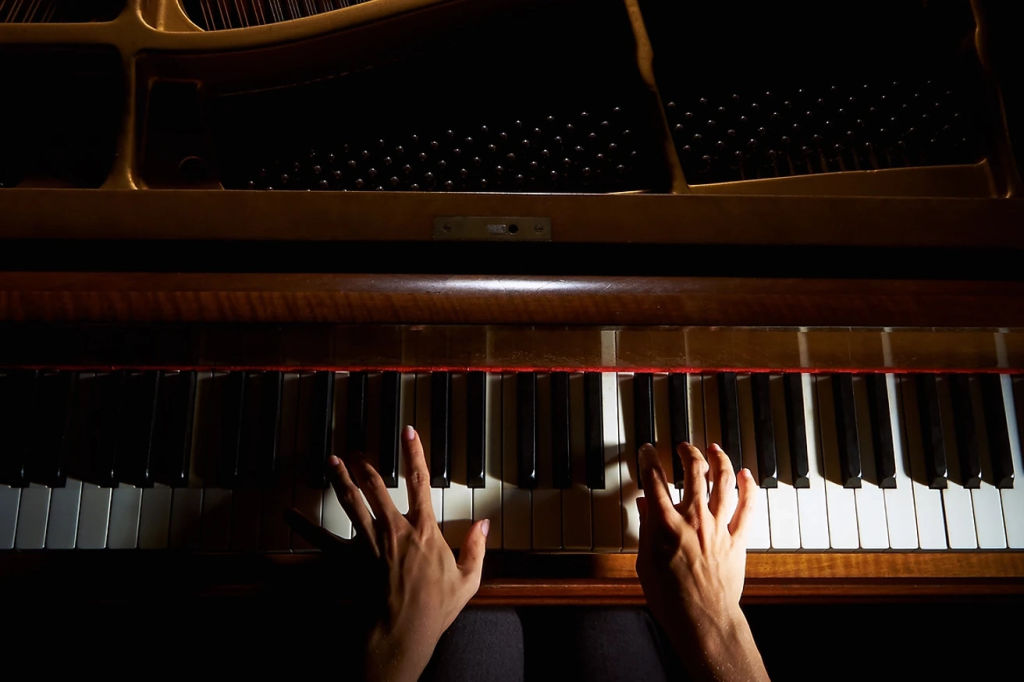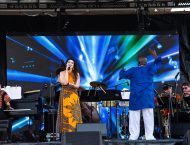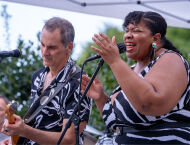Music
 Piano player. Photo courtesy of conservatory.
Piano player. Photo courtesy of conservatory.
A Fairfax Music School Makes Learning Music More Accessible
October 7, 2022 @ 12:00pm
Many of us sustain a lifelong passion for music without ever learning to play an instrument. The prospect can seem intimidating, especially for those of us well past college. However, there’s an irresistible power that comes from playing an instrument and wrapping your mind around learning a new skill. Once you start playing music, it can be hard to stop.
Sterling Conservancy of Music, located in Fairfax, Virginia, and serving the region, makes it easy to get started.
Founded in 2009, Sterling Conservancy of Music provides accessible music lessons to students of all ages and skill levels living in D.C. and Northern Virginia, including piano, harpsichord, guitar, harp, voice, and musical theater coaching. Faculty come from some of the world’s most renowned music schools, but don’t be intimated — SCM is geared toward community enrichment, accessibility and, above all, fun.
We spoke with Director Gretchen Sterling about her work, her career in (and her lifelong passion for) classical music, and the benefits of learning to play. Answers have been edited for clarity and length.
District Fray: What’s your history with music?
Gretchen Sterling: I started learning piano lessons at the age of 7, but my early days were spent experimenting on my grandmother’s electric organ. I went on to study at the Royal Welsh College of Music and Drama in Cardiff, Wales, and was one of the youngest students ever accepted into the undergraduate program, auditioning at age 15. I completed my Master’s in piano performance from the London College of Music and began my teaching career in the States in 2008, building a reputation for innovative methods in teaching piano technique. I studied with prominent artists, which allowed me to experience a unique tradition in classical training that can directly be traced back to Beethoven and Russian composer, Nikolai Medtner. Additionally, I completed professional studies on music and the brain through Berklee College of Music, and hold certificates in audio engineering and music production.
What’s unique about the Sterling Conservancy of Music?
We are a highly adaptable and diverse group of professionals all in one place. Our hiring process is very selective. We have really carved out a niche as one of Metro D.C. and Northern Virginia’s top music centers for adult students, and we’ve created a real community here for adults who can connect socially, intellectually, and emotionally.
What are some benefits of learning to play music, particularly for adults who love music but haven’t trained previously?
The benefits of music are lifelong. First of all, it’s fantastic for the brain. Adults in particular can reap huge rewards mentally and emotionally because the practice of learning music develops new neurons in the brain, keeps critical thinking skills sharp, enhances memory, and, especially in a school setting, enables social connections with like-minded people. Especially as an adult, it can be difficult in this day and age to make long-lasting connections with fellow adults who are not co-workers or neighbors. People who are interested in the same subject naturally develop stronger connections, and because music really requires a more long-term commitment, it enhances the opportunity for connection and builds communication skills. In addition to the social benefit, music greatly enhances working memory, which is a skill many people could improve on, plus pattern recognition, listening skills, and creativity.
What is your advice for someone who gets discouraged learning a new skill?
Cut yourself some slack. Especially as adults, we spend most of our lives learning how to categorize and become critical thinkers, but as we carry those stringencies into adulthood, we psychologically get in our own way. There’s also a disconnect between the reality of learning — which requires failures and mistakes to occur in order to grow vs. intellectual understanding equaling attainment. When it comes to music, people usually start to feel discouraged when their intellectual level of understanding is above that of their level of physical attainment. Learning an instrument requires more than just understanding. Putting that understanding into regular, consistent action requires grit and discipline. The best advice to someone learning music is to set small, realistic goals, be patient and persistent, and show humility. Those who laugh at their mistakes and keep going are far more successful than those who get frustrated for expecting something unreasonable of themselves. That’s another reason learning music is so valuable. It teaches us how to be open-minded and forgiving of our imperfections.
Enjoy this piece? Consider becoming a member for access to our premium digital content. Support local journalism and start your membership today.







